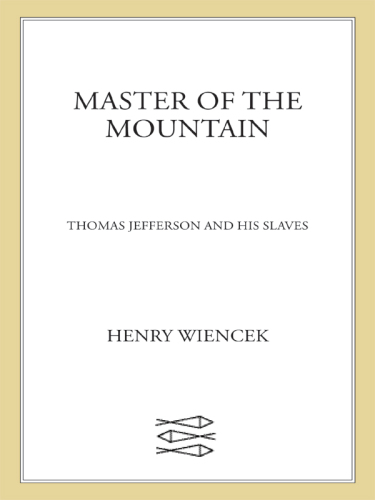
Master of the Mountain
Thomas Jefferson and His Slaves
فرمت کتاب
ebook
تاریخ انتشار
2012
Lexile Score
1260
Reading Level
9-12
نویسنده
Henry Wiencekشابک
9781466827783
کتاب های مرتبط
- اطلاعات
- نقد و بررسی
- دیدگاه کاربران
نقد و بررسی

Starred review from May 28, 2012
That the author of the Declaration of Independence owned slaves, likely fathered several children with a slave, and used slaves as collateral to borrow funds to build Monticello is widely acknowledged. Historians often explain this paradox by claiming Jefferson was powerless to change the system, accusing those who now criticize Jefferson of “presentism.” Yet NBCC Award–winning historian Wiencek (The Hairstons: An American Family in Black and White) reveals that many of Jefferson’s contemporaries, such as Quaker plantation owners in the 1770s and a prominent Virginian, Edward Coles, in 1819, freed their slaves. Coles begged Jefferson to lend his voice to the antislavery movement, as did fellow revolutionaries such as Lafayette and Thomas Paine. But, Wiencek says that the founder who referred to blacks as “degraded and different” with “no place in our country,” had a “fundamental belief in the righteousness of his power.” Jefferson, asserts Wiencek, began to prevaricate about slavery after computing “the silent profit” of 4% per year from the birth of slave children. This meticulous account indicts not only Jefferson but modern apologists who wish to retain him as a moral standard of liberty. Wiencek’s vivid, detailed history casts a new slant on a complex man. 8 pages b&w illus. Agent: Howard Morhaim, Howard Morhaim Literary Agency.

Starred review from August 1, 2012
A well-rendered yet deeply unsettling look behind the illusion of the happy slaves of Monticello. That Jefferson was riven by contradictions as both a passionate advocate of liberty and a dedicated slave owner is not new to scholars and historians. Yet Wiencek (An Imperfect God: George Washington, His Slaves, and the Creation of America, 2003, etc.) scours the primary sources, such as Thomas Jefferson's Farm Book, for a thoughtful reexamination of what was really going on behind the harmonious facade of the great house on the mountain. So much about Monticello was artful, full of contrivances, contraptions, inventions and labyrinths. It was an innovative and eccentric place, tricking the eye and keeping the visitor somewhat off balance. Wiencek does note some of the times when the facade was broken: "In one instance, a gentleman dining with Mr. Jefferson, looked so startled as he raised his eyes from the latter to the servant behind him, that his discovery of the resemblance was perfectly obvious to all." Indeed, all the slaves at Monticello were related to one another, descendants of matriarch "Betty" Hemings, who had been the concubine of Martha Jefferson's father, rendering Betty's many children by him, including Sally, her own half siblings. Rather reluctantly, Wiencek looks at the substance behind the scandal of Sally and Jefferson's reputed liaison and admits solid evidence. The author thoroughly examines Jefferson's writings, such as Notes on the State of Virginia, for his problematic theories on race, miscegenation and human bondage, and he marvels at the man's ability to justify what he called an "execrable commerce." Slave suicides, runaways, whippings by his overseers and his furtive freeing of Sally's two oldest children--the secrets and evasions compounded one another. Yes, Jefferson inherited slavery, but he knew better. Beautifully constructed reflections and careful sifting of Jefferson's thoughts and deeds.
COPYRIGHT(2012) Kirkus Reviews, ALL RIGHTS RESERVED.

May 1, 2012
Winner of the National Book Critics Circle Award in 1999 for The Hairstons: An American Family in Black and White, Wiencek returns to the bloody ground of white/black, master/slave relations that have defined America. He seeks to explain why our liberty-spewing third President continued to keep slaves by looking at his account books. Not for the starry-eyed.
Copyright 2012 Library Journal, LLC Used with permission.

























دیدگاه کاربران